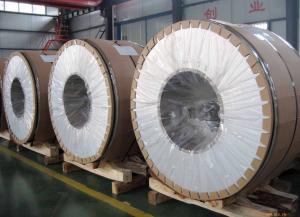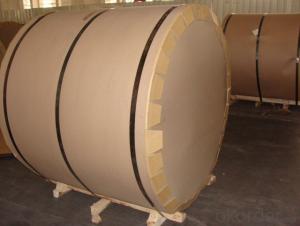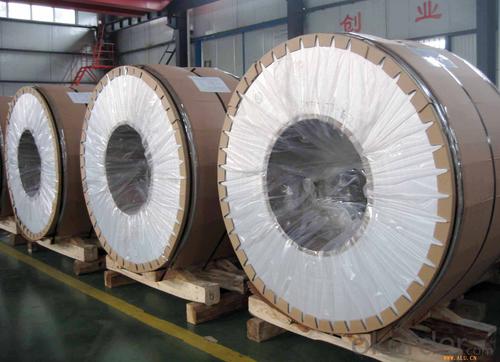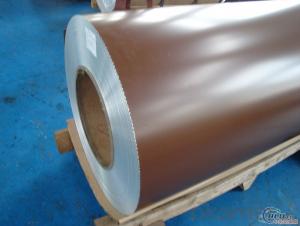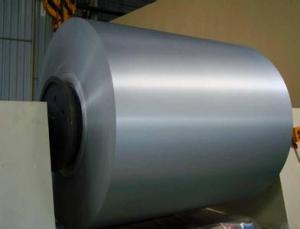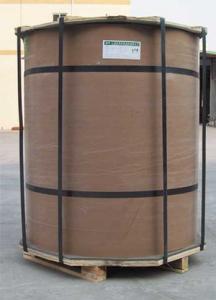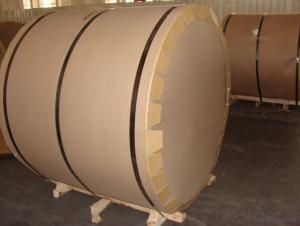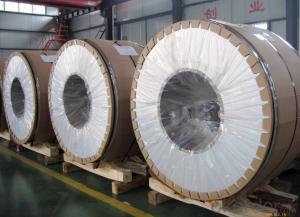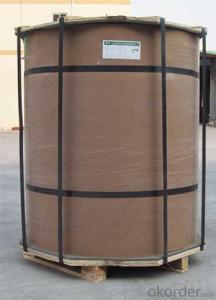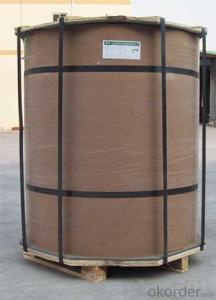Customized Mill Finished Aluminum Coils 5xxx AA5052
- Loading Port:
- China Main Port
- Payment Terms:
- TT or LC
- Min Order Qty:
- 8 m.t.
- Supply Capability:
- 100000 m.t./month
OKorder Service Pledge
OKorder Financial Service
You Might Also Like
1.Structure of Mill Finished Aluminum Coils 5xxx AA5052 Description
Mill Finished Aluminum Coils 5xxx AA5052 has great ductility, Resistant to weather corrosion ,durability, formability, self Cleansing.
Mill Finished Aluminum Coils 5xxx AA5052 is widely used for Construction /Furniture/decorate/industry,etc. Such as electronics, instruments, lighting decoration, house decoration, curtain wall, honeycomb-core panel, sandwich panel.
2.Main Features of Mill Finished Aluminum Coils 5xxx AA5052
• Superior quality of raw material
• Reasonable and stable chemical composition
• Accurate tolerance
• competitive price
3.Mill Finished Aluminum Coils 5xxx AA5052 Images
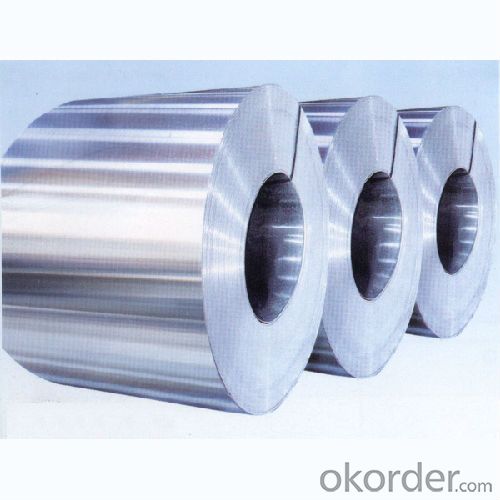
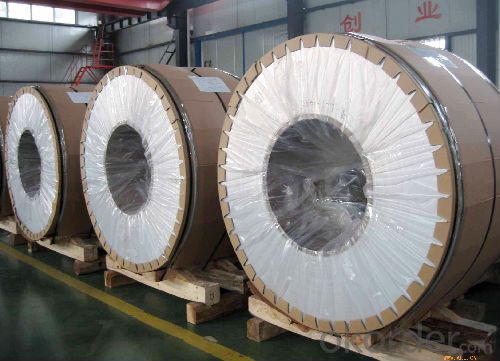
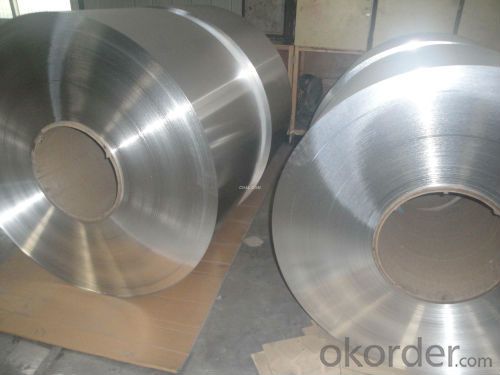
4.Mill Finished Aluminum Coils 5xxx AA5052 Specification
Alloy | AA5052 |
Temper | H14, H16, H18, H22, H24, H26, H32, O/F |
Thickness | 0.2mm -- 100mm |
Width | 30mm -- 1700mm |
Standard | GB/T 3880-2006,EN,ASTM,JIS |
5. FAQ of Mill Finished Aluminum Coils 5xxx AA5052
A.How to guarantee the quality?
Customers are welcome to our mill to visit and check the products. Besides, we can arrange a third party to Mill Finished Aluminum Coils 5xxx AA5052.
B. Now which countries do you export your goods?
Now we export to South East Asia,Africa, North America,South America ect.
- Q: I need to draw dot and cross diagrams to explain how they bond, but if the aluminium outer shell has 13 electrons and the oxygen one has 6, how do they all become happy atoms, and all have a full outer shell? please help! thank you.
- Aluminum's outer shell is 3, not 13. 13 is the total number of electrons it has. Looking a the periodic table, Oxygen's usual valance state is -2 as an ion. Aluminum's valance state is always +3. This means that oxygen gains 2 electrons to get a charge of -2 and aluminum lose 3 electrons to get a charge of +3. As for electron configuration, aluminum has 13 electrons in total. 2 e- is in the 1st sublevel. 8 e- is in the 2nd sublevel. That leaves 3 e- left but 3 is not a stable number so aluminum wants to lose those 3 e- to become stable. Oxygen has 8 electrons. 2 e- is in 1st. 6 e- is in 2nd. 6 is not a stable number so oxygen wants to gain 2 more e- to become a full set of 8. Aluminum want to lose 3, Oxygen want to gain 2. We need to balance those. 3 x 2 = 6 2 x 3 = 6 Because Aluminum's usual state is +3, we can have 2 Aluminum atoms bonding. If both lose 3 e-, they both have stable outer shell of 8 (2nd sublevel) and lose 6 e- in total. Oxygen's usual state is -2, but there are 6 e- to gain to oxygen can have 3 atoms bonding. If all 3 atoms receive 2 e- in each, then that's 6 and they're all stable, also at 8 e-. So in order to turn them into happy atom, we need 2 Aluminum and 3 Oxygen to bond together. So the chemical formula is Al2O3 (Aluminum Oxide) *** I'm not very good at explaining, I did the best I can. As for the drawing, I can't do that on the computer. It would have been a whole lot easier if I can though.
- Q: Are there any health or safety concerns related to aluminum coils?
- Aluminum coils can pose some health and safety concerns, especially in certain circumstances. One potential concern is the release of aluminum particles or fumes into the air, particularly during the manufacturing or processing of aluminum coils. Inhalation of these particles or fumes can potentially lead to respiratory issues or lung damage. Additionally, aluminum coils that are damaged or corroded may release aluminum ions into food or beverages, which can be harmful if ingested in excessive amounts. However, it is important to note that the risks associated with aluminum coils are generally minimal and can be mitigated through proper handling and maintenance. For instance, manufacturers typically employ various safety measures to prevent the release of aluminum particles or fumes during production. Furthermore, aluminum coils used in heating, ventilation, and air conditioning systems are typically coated or treated to prevent corrosion and the subsequent leaching of aluminum ions. To minimize any potential health risks, it is recommended to follow safety guidelines provided by manufacturers, such as wearing appropriate protective gear during handling, and ensuring proper ventilation in areas where aluminum coils are processed or installed. Additionally, regular inspection, cleaning, and maintenance of aluminum coils can help identify and address any potential issues before they become a health or safety concern. In conclusion, while there are some health and safety concerns related to aluminum coils, these risks can be managed through proper handling, maintenance, and adherence to safety guidelines. It is always advisable to consult with professionals or manufacturers for specific instructions and recommendations related to the utilization and maintenance of aluminum coils in order to ensure maximum safety.
- Q: What are the typical mechanical properties of aluminum coils?
- The mechanical properties of aluminum coils can vary depending on the specific alloy and temper of the material. However, some typical mechanical properties of aluminum coils include: 1. Tensile strength: Aluminum coils generally have a high tensile strength, which refers to the maximum amount of tensile stress a material can withstand before it breaks. This property is important for applications that require the material to withstand heavy loads or stress. 2. Yield strength: Yield strength is the amount of stress a material can withstand without permanently deforming. Aluminum coils typically have a relatively high yield strength, allowing them to maintain their shape and structural integrity under normal operating conditions. 3. Elongation: Elongation refers to the amount a material can stretch or deform before it fractures. Aluminum coils typically have a relatively high elongation, making them suitable for applications that require the material to be formed or bent without breaking. 4. Hardness: The hardness of aluminum coils can vary depending on the alloy and temper. Aluminum alloys can be heat-treated to increase their hardness, making them more suitable for applications that require wear resistance or need to withstand harsh environments. 5. Fatigue strength: Fatigue strength is the ability of a material to resist the formation and growth of cracks under cyclic loading conditions. Aluminum coils generally exhibit good fatigue strength, making them suitable for applications subjected to repeated or fluctuating loads. It is important to note that these properties can vary depending on the specific alloy, temper, and processing conditions of the aluminum coils. Therefore, it is recommended to consult the material specifications or contact the manufacturer for more accurate and detailed information on the mechanical properties of specific aluminum coils.
- Q: Are there any limitations to using aluminum coils?
- Using aluminum coils comes with several limitations. Firstly, their cost is higher compared to other materials like copper, which can be a constraint for those with budget constraints. Secondly, aluminum coils have lower thermal conductivity than copper coils. This means they are less efficient at transferring heat, resulting in decreased performance in some applications. In addition, aluminum is more prone to corrosion and oxidation than other materials. This limitation is particularly relevant in highly corrosive environments, like coastal areas or industrial settings. Moreover, aluminum coils are generally unsuitable for high-pressure applications. They are more likely to experience leaks or failures under high pressure, which restricts their use in certain HVAC systems or refrigeration units. Lastly, aluminum coils are less malleable than copper coils, making them more challenging to handle during installation or repair. This can lead to increased labor costs or potential damage to the coils during handling. Overall, although aluminum coils have advantages like being lightweight and environmentally friendly, their limitations must be carefully considered based on the specific application and requirements.
- Q: Is it safe and effective to use an electric stove to heat an aluminum coil?
- <p>Yes, you can use an electric stove to heat an aluminum coil. Aluminum is a good conductor of heat, so it will heat up when placed on an electric stove. However, it's important to ensure the coil is clean and free of any non-stick coatings that could be damaged by high heat. Also, be cautious of the temperature settings on your stove, as aluminum can melt at high temperatures. Always monitor the coil to prevent overheating or fire hazards.</p>
- Q: Are there any special considerations for handling and storing aluminum coil scraps?
- Yes, there are special considerations for handling and storing aluminum coil scraps. It is important to segregate aluminum scraps from other metals to prevent contamination. They should be stored in a dry and well-ventilated area to avoid moisture absorption and potential corrosion. Additionally, proper labeling and organization are crucial to ensure easy identification and retrieval of the scraps when needed.
- Q: Can aluminum coils be anodized for enhanced durability?
- Yes, aluminum coils can be anodized for enhanced durability. Anodizing is a process that creates a layer of aluminum oxide on the surface of aluminum, making it more resistant to corrosion, wear, and scratches. This layer also provides added protection against UV rays and harsh environmental conditions. By anodizing aluminum coils, they become more durable and can withstand prolonged use in various industries such as construction, automotive, and electronics. Additionally, anodized aluminum coils can be further treated with additional coatings or finishes to enhance their appearance and offer further protection. Overall, anodizing aluminum coils is a widely used and effective method to enhance their durability and prolong their lifespan.
- Q: Are aluminum coils suitable for architectural sunshades?
- Yes, aluminum coils are suitable for architectural sunshades. Aluminum is a lightweight and durable material that can withstand various weather conditions. It is also corrosion-resistant, making it ideal for outdoor applications. Additionally, aluminum coils can be easily formed and shaped to create customized designs for sunshades, providing both functionality and aesthetic appeal.
- Q: Are aluminum coils prone to corrosion?
- Yes, aluminum coils are prone to corrosion. Aluminum is a reactive metal that easily forms a protective oxide layer when exposed to oxygen. However, this oxide layer can be compromised by certain environmental factors, such as exposure to moisture, salt, or other corrosive substances. Over time, this can lead to the formation of corrosion on the surface of aluminum coils. Regular maintenance and proper care, such as cleaning and applying protective coatings, can help mitigate the risk of corrosion.
- Q: What is the role of aluminum coils in the construction of railways?
- Aluminum coils are used in the construction of railways for various purposes, primarily for the manufacturing of overhead lines and electrical conductors. Due to their high conductivity, lightweight nature, and corrosion resistance, aluminum coils are ideal for transmitting electrical power and ensuring efficient and reliable railway operations. These coils are also utilized in the production of railway carriages and components, providing strength and durability while reducing overall weight, which ultimately improves fuel efficiency and lowers operating costs. Overall, aluminum coils play a crucial role in enhancing the performance, safety, and sustainability of railway systems.
Send your message to us
Customized Mill Finished Aluminum Coils 5xxx AA5052
- Loading Port:
- China Main Port
- Payment Terms:
- TT or LC
- Min Order Qty:
- 8 m.t.
- Supply Capability:
- 100000 m.t./month
OKorder Service Pledge
OKorder Financial Service
Similar products
Hot products
Hot Searches
Related keywords
